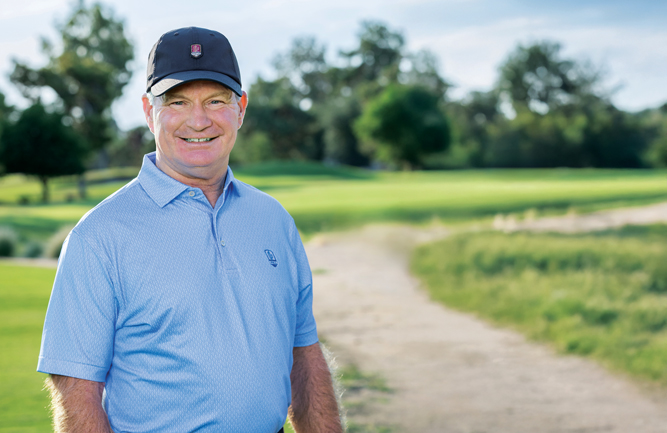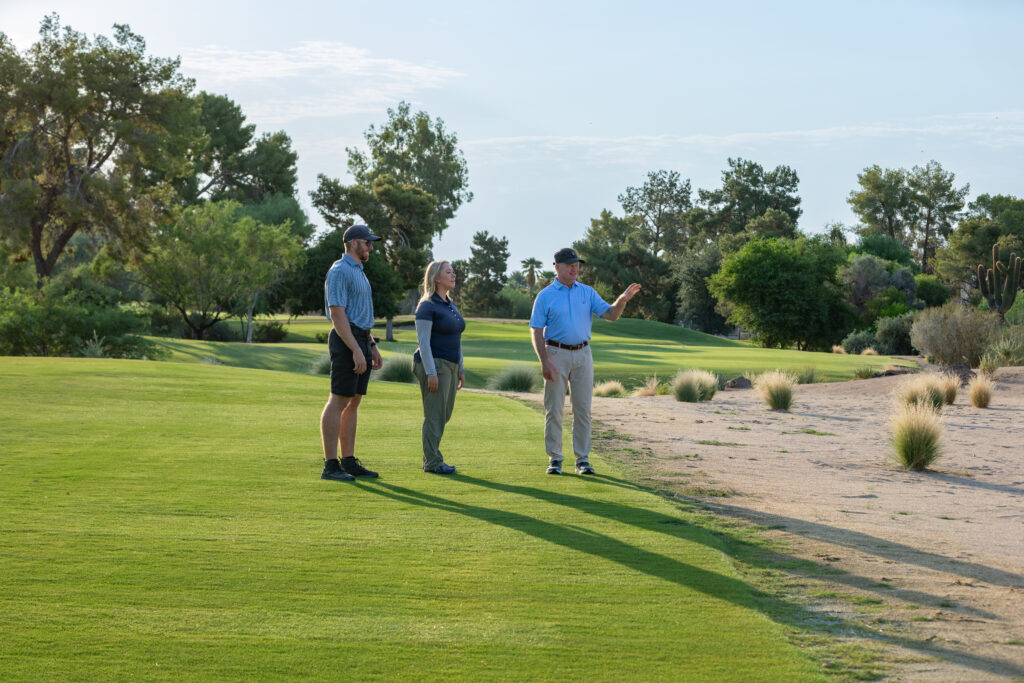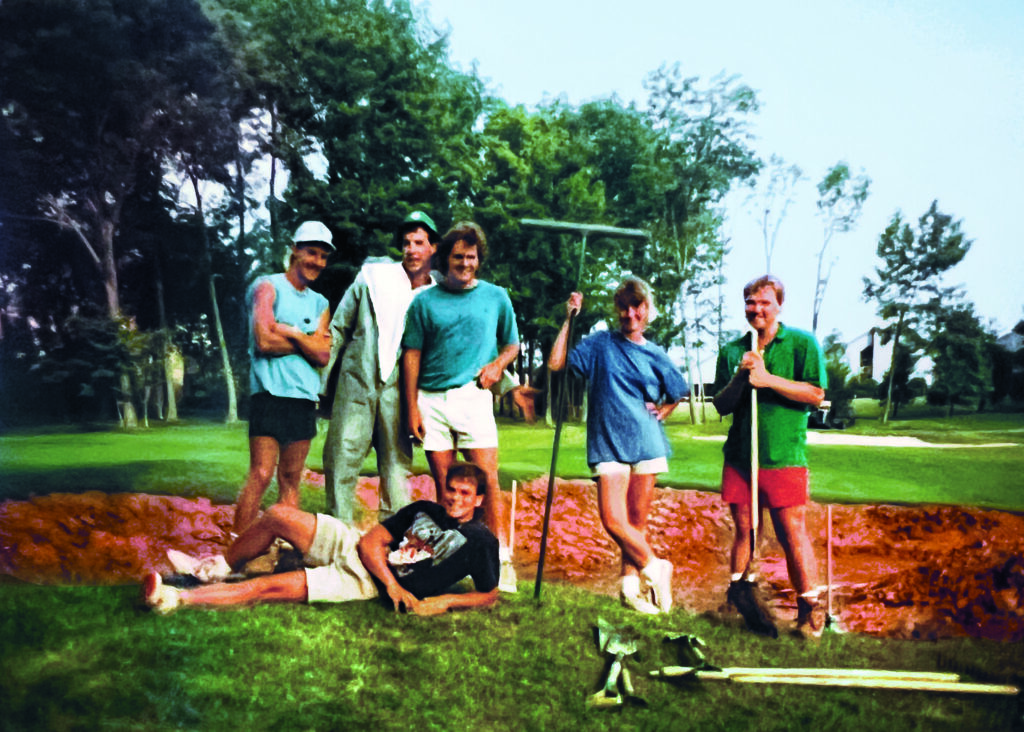 Photo by: David Huff Photography
Photo by: David Huff Photography
Twenty years ago, Rob Collins was in fear of losing his job.
Paradise Valley Country Club in Paradise Valley, Ariz., is one of those premier private clubs that seeks no publicity … especially bad publicity. In 2006, Paradise Valley CC members and employees saw the name of their course in the news. The reason? The course, along with others, was cited by the Arizona Department of Water Resources for exceeding its allocated water amount.
“They handed out a fine and put our name in the paper,” Collins recalls. “It’s hard to not take that personally. This is what you do. You spend hours every day working toward a goal. And then you’re handed a citation, your name is in the paper and everybody’s upset.”
The immediate reaction was to turn the water off on 10 of the course’s 122 acres. Turf died. Huge trees died.
“You’d drive the course, and it was like there were scabs on the course,” Collins says. “You can’t ignore it or pretend it didn’t happen. In the moment, it was a constant reminder that something was wrong. We screwed up, and we’ve got to fix it.”
For his entire professional career — which started in 1983 with the U.S. Navy aboard the USS Nimitz — Collins has been fixing things. After an honorable discharge from the Navy, he discovered golf course maintenance and “it set the hook.” Time at Ohio State University, an internship at Muirfield Village, stops in Scottsdale and then St. Louis, followed by a return to Arizona and Paradise Valley CC in 1995.
Forty years later, he was inducted into the Arizona Golf Hall of Fame.
“Mark (Woodward) called me to tell me, and he happened to be with Shawn Emerson at the time; they’re both good friends of mine,” Collins says. “They were driving in Texas and told me. It’s a great honor. It’s nice to be recognized. It’s not until after you experience it and you look back and you realize … this is cool.”
Everyone loves Rob
For many reasons — among them that recent induction into the Arizona Golf Hall of Fame — Collins is Golfdom’s 2025 Herb Graffis Businessperson of the Year. Along with his business acumen, Collins is often referred to as an outstanding superintendent and a kind man.
“Rob Collins is a fantastic superintendent,” says longtime Desert Mountain director of agronomy Shawn Emerson, now with GSI Executive Search, who nominated Collins for the Award. “He’s just kept developing procedures in the business world of a golf course superintendent, in the sense that he’s taken care of his golf course and focused on playability at the same time. Over time, he’s become a leader in Arizona, working with city officials on water.”
 Assistant Superintendents Oliver Clanin and Madison Rudsinski listen as Collins shares some wisdom. “Rob has some pretty unconventional tactics,” Clanin says. (Photo by: David Huff Photography)
Assistant Superintendents Oliver Clanin and Madison Rudsinski listen as Collins shares some wisdom. “Rob has some pretty unconventional tactics,” Clanin says. (Photo by: David Huff Photography)
Interestingly, it was Collins who replaced Emerson’s father as superintendent at Paradise Valley CC. It was Emerson’s “dream job,” but also a place he never got to work because bylaws forbid Emerson’s father from hiring his son.
“Rob treated my dad with so much respect,” Emerson recalls. “No one could replace my legend (father) better than Rob, because he’s so respectful and kind.”
Collins was also nominated by Woodward, a former president of GCSAA as well as the CEO of the association in the mid-2000s and the host superintendent of the 2008 U.S. Open at Torrey Pines. Woodward calls Collins “one of the best superintendents in the state of Arizona.”
“One of the reasons I nominated him is because he’s so active with our local association and the Arizona Water Association,” Woodward says. “And also, the way he approaches his own course — he does a lot of research there. He knows all the latest and greatest in turf.”
Woodward adds that Collins has, for a long time, served his fellow superintendents in Arizona as a spokesperson on behalf of the industry.
“The best thing about Rob is he’s very calm, he never gets rattled when he’s doing presentations,” Woodward says. “He’s very thoughtful. When he talks, people listen. He’s done a lot of really cool interviews with our local media. There couldn’t be a better proponent for our industry — everyone loves Rob.”
Will it sink, or will it float?
Collins looks back at that citation in 2006 as one of his most memorable days as a superintendent. It set in motion a major irrigation renovation and turf reduction at Paradise Valley CC, and work continues to this day to study the course and how it can best maintain its status as a premier facility while also being a good steward of the environment.
“We are tethered to our weather station and make a lot of decisions based on weather. We’ve migrated to moisture meters. I know that’s commonplace, but we’re working with it to a degree that we’re one of the courses working with Toro on a new software they’re developing with turfRad,” Collins says. “Our goal is to get down to 90 acres of turf or less yet maintain our feel of a parkland course in a desert environment, which is unique.”
Collins has an assistant superintendent, Oliver Clanin, whose sole responsibility is moisture management and daily adjustments.
“Rob has some pretty unconventional tactics that we like to use,” Clanin says. “I drive turfRad pretty much every day and then make adjustments. You can’t get (irrigation) perfect — there are lots of adjustments, nozzle adjustments and sometimes things break.”
“The water topic is profound for us,” Collins says. “It’s about evaluating how the course dries down differently and being able to put water where it’s needed. I think (superintendents) have thrown out the DU (distribution uniformity) model, and they’ve oriented themselves with what people are calling the MU model — moisture uniformity. Having a system to measure and evaluate the change in moisture is where we’re headed.”
In the induction ceremony for the Arizona Golf Hall of Fame, Brian Whitlark, USGA agronomist for the West region, called Collins “the Benjamin Franklin of water conservation forefront in Arizona.”
Collins considers his course a laboratory and is thrilled when a company connects with him to test their new technology. A recent example: A company that has taken bomb detection technology used by New York City police and adapted it to agriculture as a way to detect neutrons and then volumetric water content.
“They have this gizmo — it’s the size of my desk — and they came out and said, ‘Rob, we hear you’re doing a lot with moisture testing.’ It’s measuring cosmic rays as they hit the Earth based on soil moisture,” Collins says. “We put it between our second and eighth holes, and the third and seventh, and we waited to see if this would sink, or would it float? And it worked. It was within .1 of what we measured it at. So, they asked me if they could install them in our driving range. It’s measuring the change in soil moisture, which is unique.”
Opening doors
Madison Rudsinski studied horticulture science and floral design at Kishwaukee College in Malta, Ill. During COVID, she took an internship at a golf course and fell in love with the industry.
She decided to try golf maintenance in the desert southwest and sent out résumés to courses on her wish list. Collins was the only one to respond.
 A snapshot of the “fraternity” of interns Collins worked with at Muirfield Village. (Photo courtesy of: Rob Collins)
A snapshot of the “fraternity” of interns Collins worked with at Muirfield Village. (Photo courtesy of: Rob Collins)
“He saw that I had a background in horticulture science and asked if I’d like to come on as an assistant-in-training,” Rudsinski says. “Not many people would give somebody that’s still training and going to school the opportunity to move up in the club, especially in a club like this.”
Since joining the staff at Paradise Valley, Rudsinski has volunteered on the crew for the 2021 U.S. Women’s Open at The Olympic Club in San Francisco; the 2023 U.S. Women’s Open at Pebble Beach; the 2022 U.S. Open at The Country Club in Brookline, Mass.; and was accepted into Nufarm’s Excel Leadership program.
“(Collins) has been a great mentor. He’s opened a lot of doors for me and helped me become who I am,” she says.
Collins’ willingness to try “unconventional tactics,” as Clanin describes them, is one of the things Rudsinski appreciates most about her job as lead assistant superintendent at Paradise Valley CC.
“Here, it’s like its own little research facility,” she says. “We work a lot with Pogo. We work a lot with turfRad. We have the turf reduction project. We’re looking at zoysia and tracking how it conserves water differently than bermudagrass varieties. It keeps you on your toes, all of our projects.”
Fortunate at Paradise
In May, Collins celebrated his 30th year as director of greens and grounds at Paradise Valley CC. He recently found a photo of the crew he worked with back at Muirfield in 1988 and marveled at how many of those people he still knows and the great things they’ve accomplished in golf.
“Working at Muirfield, it was such a fraternity,” he says. “Just deep friendships. Without dropping names, there’s a core group and … those friendships … I look at where all those people are, 30 years later, we’re all in these great positions.”
Collins is still married to his high school sweetheart — Misty asked him to the Sadie Hawkins dance when they were in the ninth grade. The couple has hiked the Grand Canyon rim to rim six times and also likes to build homes. Someday, maybe, he’ll retire to one of those homes.
But he isn’t thinking about retirement yet.
“You turn 60, and people start asking you about retirement. I don’t know what (retirement) looks like,” he says. “The young folks I see, I guess maybe I can see myself in them. I don’t think I’m reliving my youth through them, but I see their ambition, and it’s contagious. They want to learn more, and we’re in a good position to help. I’m fortunate that, here at Paradise Valley, we’re comfortable with trying new technology, with trying things out.
“We’ve had good success in finding really good employees, including our two assistants who want to seek a path in turf. (Rudsinski) got to volunteer at The Olympic Club, and then she went to Brookline. She’s killing it, the hook is set,” Collins continues. “That’s what’s exciting for me. Who doesn’t want to be a part of that?”






